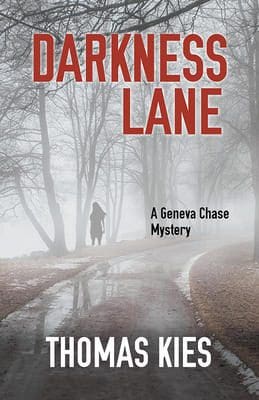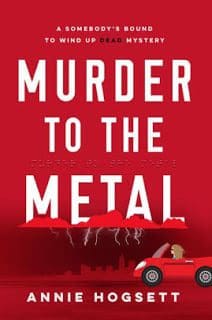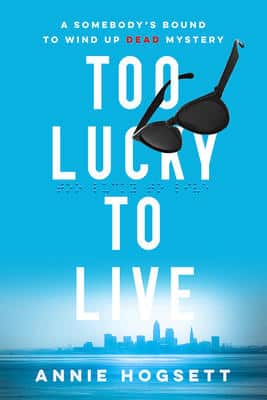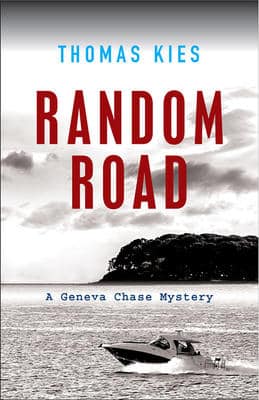Annie Hogsett and Thomas Kies are authors whose first and second books came out from Poisoned Pen Press at about the same time. Their third books are scheduled for release this fall. You can order their books through the Web Store. https://store.poisonedpen.com
While we’re waiting, we’ll share a conversation they had with Michael Barson about writing that second novel. Hogsett talks about Murder to the Metal, and Kies’ second book was Darkness Lane.
Michael Barson – What was the single biggest roadblock you discovered in writing your debut novel that affected the way you approached your second book?
Tom– When I wrote RANDOM ROAD, I didn’t envision that it would be a series. My first book has a very neat ending. Everything is tied up at the end. Everyone, with one notable exception, lives happily ever after. In writing DARKNESS LANE, I had to quickly deconstruct all of that and recreate the flaws that made Geneva Chase interesting in the first place.

Annie– I know this may sound like a flippant answer, but I’m serious: Looking for a publisher. As committed as I was, pre-Poisoned Pen Press, to the story of TOO LUCKY TO LIVE, and to Allie, Tom, and Tom’s accidental $550 million jackpot—all that writing and rewriting often felt like putting a message in a bottle and dropping it into deep water. For MURDER TO THE METAL, knowing someone was actually waiting for the second novel introduced the most compelling incentive I could have imagined. A deadline. Yikes!

2) You each appeared at a number of public events to promote your first book when they were published… Was there anything about those events, and interacting with the public, that detoured from your expectations?
Tom– Yes, some of them were very well attended and those events are a hell of a lot of fun. And then…there are the book signings where nobody knows you. Bookstores where the customers didn’t know who Thomas Kies was and had never heard of RANDOM ROAD, customers straining to avoid eye contact. We always managed to sell enough copies that the bookstores have asked me back but sometimes it felt awkward. I will say, the best events are the ones serving alcohol. Don’t know why, just sayin’.
Annie—Wow. I wish I’d kept a journal last year. Every event I did—a hundred attendees or four—had unexpected moments that were amazing to me. Even sitting behind a stack of books, like a puppy at the pound—that eye contact thing is a bear, Mr. Kies—yielded conversations I loved. One highlight. Tom Bennington, lucky-unlucky lottery winner and significant other of my protagonist, is blind. The Cleveland Sight Center has been a wonderful source of information, inspiration, and friendship for me. They invited me to their book group discussion of TOO LUCKY TO LIVE. It was the rowdiest, warmest, best four-hour book group ever.

3) Did you find writing the second book in a series more or less difficult than writing the first? Why so?
Tom—It was nice revisiting the recurring characters. It was like catching up with old friends. But it felt like there was more pressure. The national reviews for RANDOM ROAD were good and I make sure I read every review and comment on Amazon and Goodreads, even the critical ones. And not everyone is going to love, love, love your book. I kept those people in mind as I wrote DARKNESS LANE, determined that the second book would be even better than the first. Even so, I worried. You can ask Annette, my editor, but when I sent her the manuscript, I was a puddle of insecurity.
Annie—Well, both more and less. A deadline ratchets up the pressure. I had seven years with the first book. About seven months for the second. So, there’s that “Yikes!” again. But in some ways it was easier. I was able to focus and keep going because someone was waiting this time. All that good advice about “sit down and write like it’s your job” is more compelling when it is your job. And writing for publication made my readers more real to me. It was thrilling and energizing. And when it was all done, I was so tired.
4) Now having two published books under each of your belts, what advice would you have offered your younger selves as you prepared to begin the work of writing your first mystery novel?
Tom– When writing your first mystery, don’t hold back. Put everything you’ve got on those pages. Don’t worry about the second book or the third book. From the very first sentence, there has to be tension. Never let up. And remember, dialogue is not action. Tell the reader what your characters are doing as they’re talking to each other. Put the reader in the scene. What does it look like, sound like, smell like? It took me a long time to get RANDOM ROAD published. I wish I knew when I started writing, what I know now.

Annie– Thanks, Tom. That’s all excellent advice. Now you’ve got me quizzing myself about dialogue v. action. My advice to the younger me is: Trust yourself. I wrote myself a note sometime during the first few days of MURDER TO THE METAL, and it says, “Trust whatever you’re writing while you’re writing it.” I am an incorrigible second-guesser, so that’s what I needed to hear. Also, by the time I got to the second book I understood my characters better, their personalities were more developed. More surprising too. Sometimes they tell me the story.
5) You both write your novels in the first person– but while Annie’s protagonist Allie Harper is a woman like herself, Tom’s equally convincing protagonist, Geneva Chase, is a woman UNlike himself. Annie, do you have a hankering to try your hand at a first-person male lead someday? And Tom, have you had to do any extra-curricular research to get the voice and thoughts of Geneva to come across persuasively?
Tom– I enjoy the company of women. I enjoy spending time with them. I watch, observe, and listen. Um…in doing so, one must remember that it’s a fine line from being observant and being creepy. Geneva Chase, the recurring protagonist in the series, is loosely based on two women I worked with at a newspaper in Connecticut. What she looks like, how she moves, her dialogue, the fact that she’s a snarky smartass…all comes from those two lovely ladies. And if I get into a bind, I ask my wife. She keeps me honest. And sometimes, my wife is gobsmacked when she reads something she’s said in the character’s dialogue. Because she doesn’t think I’m listening to her.
Annie— I handled many of my “write outside your comfort zone issues” by creating a black, ex-CIA agent guy as the first-person protagonist of an earlier, still-unpublished novel. Ill-advised as that may have been, it was a worthwhile exercise. I learned a lot about the challenges of inhabiting a character’s mind and world. I’m not sorry about that guy, but I’m more at home with Allie Harper. I heard her voice before I knew anything about her story. “You know you live in a rough neighborhood when somebody honks at a blind man in the crosswalk.” That was Allie Harper talking to me for the first time. She’s the voice I’d been waiting for.
